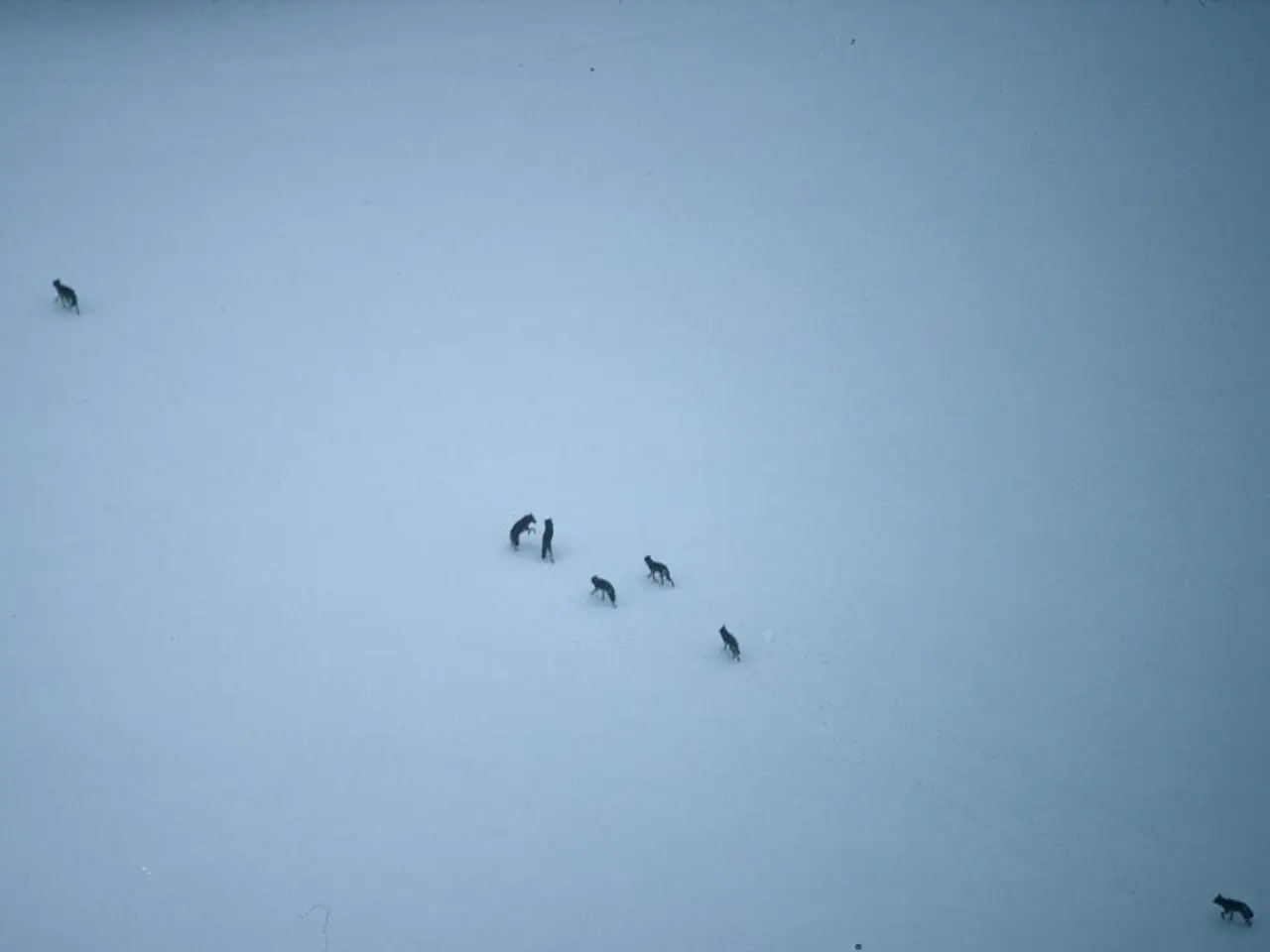Alaska's wolves unpredictably devoured all the deer, performing an unprecedented act.
In 2013, a new chapter began on Pleasant Island, Alaska, as wolves colonized the previously uninhabited land. This marked the start of a significant shift in the island's ecosystem, particularly in the predator-prey dynamics between wolves and sea otters.
Initially, wolves relied on large terrestrial prey such as deer. However, a rapid decline in the deer population followed the wolves' arrival, leading to a change in the wolves' dietary habits. By 2015, sea otters became a dominant part of the wolves' diet, making up over 80% of their food intake.
This change in diet is noteworthy as sea otters are a top predator in the near-shore ecosystem, while wolves are an apex predator in the terrestrial area. The shift is attributed to the vulnerability of sea otters during low tide when they rest on land or in shallow waters, making them easy targets for wolves.
The interaction between sea otters and terrestrial predators like wolves has had profound effects on Pleasant Island's ecosystem. Studies conducted by the Alaska Department of Fish and Game and Oregon State University researchers have confirmed this shift and its consequences.
The predation pressure by wolves on sea otters has raised important ecological questions, especially as sea otters have been recovering due to conservation efforts. However, this new dynamic has also added a factor influencing sea otter populations locally on Pleasant Island.
Moreover, studies have revealed high mercury levels in wolves feeding on sea otters, suggesting bioaccumulation of toxins through the marine food chain. This has implications for wolf health and ecosystem contamination pathways.
The pattern held through to 2020, when the study ended. As the wolves continue to thrive on Pleasant Island, researchers are investigating the impact of terrestrial predators on sea otters and how sea otters may be an abundant marine prey to terrestrial predators.
References:
- Alaska Department of Fish and Game
- Oregon State University
- Proceedings of the National Academy of Sciences
- 2025 Study on Otter-eating Wolves
- Article on the interaction between wolves and sea otters
- The ecological consequences of wolves feeding on sea otters have sparked significant research in environmental science.
- The dynamics between animals in the Pleasant Island ecosystem have been a focus of medical-condition studies, due to the mercury accumulation in wolves.
- The shift in the wolves' diet has raised concerns about health-and-wellness issues in the ecosystem, particularly neurological disorders caused by mercury.
- The interaction between terrestrial and marine predators is a hot topic in both biology and science, shedding light on climate change effects on ecosystems.
- The impact of this predator-prey dynamic on the future of the Pleasant Island environment remains a subject of ongoing research.
- The study's findings have far-reaching implications for the environmental science field, as they highlight the importance of knowing the connections between different species.
- The finance industry has shown interest in the research, as the consequences of climate change and changes in the environment have economic implications.
- In the world of cooking and lifestyle, sustainable food choices are becoming increasingly popular, partly due to findings like these.
- Many people are choosing to adopt healthier food-and-drink options to minimize their impact on the environment.
- Investing in companies that prioritize environmental protection is another trend that has emerged from the concerns about climate change.
- Businesses across various sectors are adopting green practices, hoping to reduce their environmental footprint and attract eco-conscious consumers.
- Companies in the data-and-cloud-computing field are making efforts to lower their carbon emissions, as part of their contribution to mitigating climate change.
- Technology companies are also playing a crucial role in monitoring and predicting climate change, using data to make informed decisions and develop solutions.
- Books in the education-and-self-development genre have seen new additions focusing on personal-growth and environmental awareness.
- The shift in wolves' diet has also caught the attention of authors in the sci-fi-and-fantasy genre, sparking imaginative explorations of ecological changes.
- Meanwhile, general-news outlets have reported on the impacts of the study, raising awareness about the knock-on effects of climate change.
- Crime-and-justice reporting has also highlighted the link between illegal activities and the decline of certain animal populations due to poaching.
- In sports, football, soccer, baseball, hockey, golf, and racing teams are incorporating environmental considerations into their strategies, promoting sustainability and responsible play.
- Sports-betting companies have also taken notice, offering options for wagering on games with enhanced eco-friendliness criteria.
- European leagues, NBA, MLB, NHL, and various racing organizations are taking steps to reduce their carbon emissions, adopting more sustainable practices.
- The ongoing research on the interaction between wolves and sea otters has sparked learning and skills-training opportunities in numerous fields.
- In the world of mixed-martial-arts, athletes are focusing on holistic health and wellness, improving their mental-health along with their physical conditioning.
- Weather forecasting has become an essential tool for studying climate change and its effects on ecosystems, including the interaction between wolves and sea otters.
- The auto-racing industry has started to address climate change by developing more fuel-efficient cars and promoting renewable energy solutions.
- Tennis players are partnering with organizations to promote eco-friendly practices in their sports, such as using recycled tennis balls and minimizing waste.
- Sports-analysis programs are incorporating data from climate studies to help teams make informed decisions about their strategies.
- Recently, a study titled "2025 Study on Otter-eating Wolves" has been released, providing new insights into the dynamics of these two predators.
- The article "Research on the Interaction between Wolves and Sea Otters" is a valuable resource for those interested in understanding the complexities of this unique ecological relationship.




